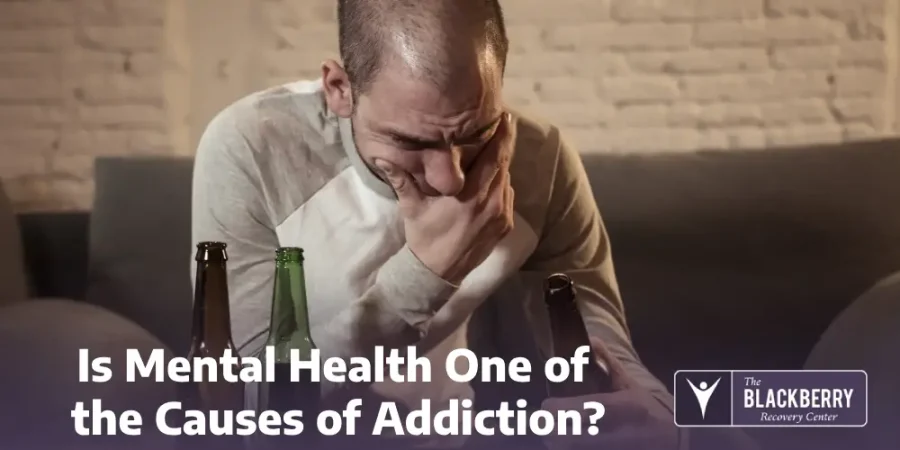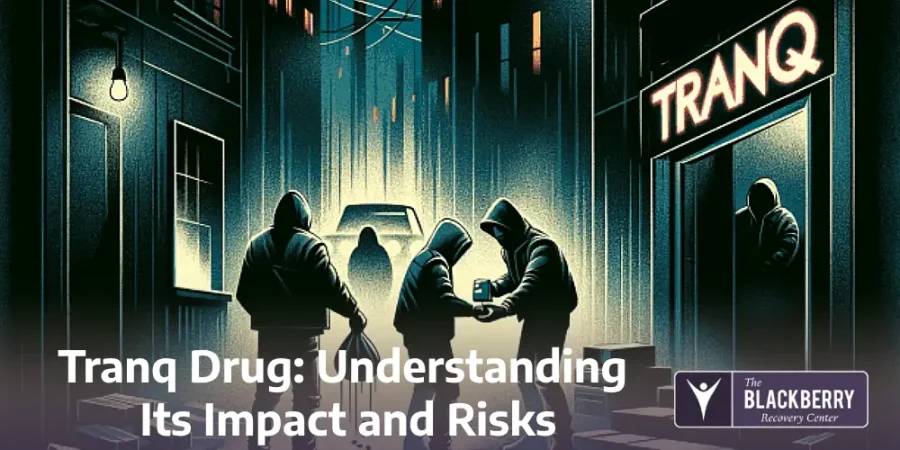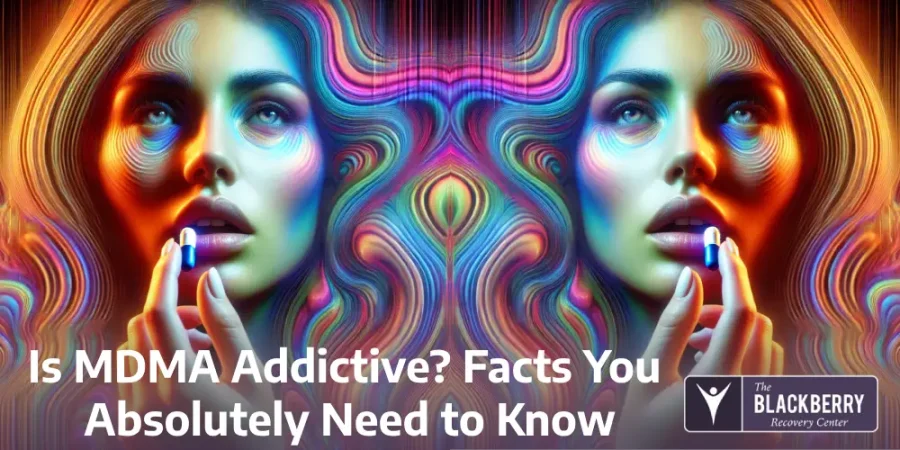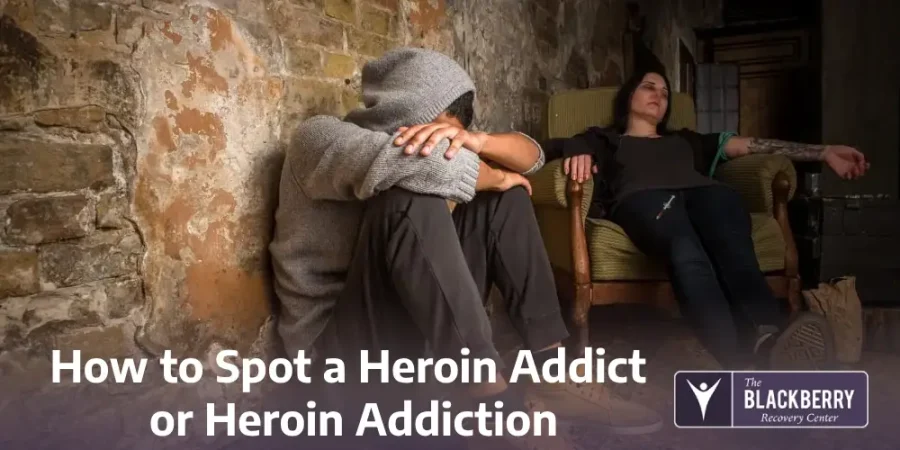There are various causes of addiction that put people at a higher risk for struggling with this disease. Addiction can be passed down through family members, for starters. Some people are also vulnerable to substance use as a result of their upbringing, health conditions, and even who they decide to spend their time with.
But one of the causes of addiction can lead people down a toxic cycle of drinking, using drugs, and relapsing without the right kind of treatment: mental health disorders. This article will explain the causes of addiction related to mental illnesses and, most importantly, provide essential resources that could help you to recover from substance use disorders and mental health concerns.
Substance Abuse and Mental Health: Are They Related?

Substance Abuse and Mental Health: Are They Related?
Research shows that mental health is one of the most significant causes of addiction. Specifically, untreated or unmanaged mental health disorders are proven to put people at a greater risk of developing co-occurring issues like addiction to drugs or alcohol.
Mental health conditions, when left untreated, can lead to a wide range of symptoms. More often than not, these symptoms are disruptive. After all, mental health directly impacts the way that humans think, feel, and behave. Without the right mental health care, people go through confusing emotions and might even have thoughts that leave them fearing for their safety.
So, how exactly is mental health one of the causes of addiction, then? When people have mental health concerns, they are often left feeling unlike themselves. In fact, studies show that people who are in mental health crises find it incredibly challenging to take control of their thoughts and feelings. The side effects that come alongside mental illness are painful, uncomfortable, and sometimes uncontrollable. As a result, people who struggle with mental health concerns are more likely to self-medicate using drugs or alcohol.
Addictive substances like drugs and alcohol might help people feel as though they can control their thoughts and feelings. Moreover, drinking or using drugs can have a calming, sedative effect—at least at first. When mental health symptoms are masked by addictive substances, it can give the person temporary relief.
However, the symptoms will always return, and in many situations, they will become even worse. This is why mental health is one of the biggest causes of addiction: the symptoms drive people to numb their feelings or forget about their pain over and over again until, before they even realize it, they are unable to stop using alcohol or drugs entirely.
Characteristics of Addiction vs. Mental Health
Differentiating between addiction and mental health concerns can feel impossible at times because they often lead right into one another. Drinking after a stressful day, for example, might just lead to more anxiety or feelings of depression. But did those stem from preexisting, untreated mental health concerns or were they caused by alcohol? Well, it’s a little bit of both.
Alcohol and drugs contain chemicals that can change the way the human body functions. Depending on the type of substance that is introduced into the body, the side effects could range anywhere from physical, to emotional, to behavioral. Alcohol and drugs greatly decrease one’s ability to make well-informed decisions. Using these substances can also bring out unwanted consequences that remain permanent even if one stops using alcohol or drugs.
At the same time, untreated mental health conditions, as mentioned earlier, can also cause reckless behaviors that turn into using more alcohol or drugs. This starts a vicious cycle in which people who struggle with addiction develop mental health symptoms and people who struggle with mental health symptoms often fall into patterns of addiction.
There are common characteristics of addiction to look out for, which include:
- Needing more frequent, larger doses of the substance to feel its effects
- Hiding the extent of the drug or alcohol use from friends and family
- Changes in behavior, personality, and ability to fulfill daily tasks
- Increased physical weariness
- Experiencing withdrawal in between periods of drinking or using drugs
- Having more mental health distress and using these substances to “cope”
What is important to remember when it comes to the causes of addiction is that recognizing the risk factors could help you to find treatment sooner before this disorder begins to disrupt your life.
But even if you are aware of all of the causes of addiction, you might still feel overwhelmed with the management of the symptoms because you haven’t treated the issue that is at the heart of your struggle. This is where treating mental health conditions alongside addiction becomes instrumental in your chances for recovery success.
Mental Health Conditions Connected to Addiction

Mental Health Conditions Connected to Addiction
Some of the most common mental health conditions that lead into addiction are:
- Anxiety
- Depression
- Bipolar disorder
- Post-traumatic stress disorder
- Phobias
- Panic attacks
- Schizoaffective disorder
All of these conditions, along with many others, range in severity depending on your specific experiences, and all of these require professional mental health treatment. If you or somebody you love is already diagnosed with one of these disorders or you suspect that you might be struggling with your mental health, finding a treatment program could help you learn healthy coping mechanisms before you turn to alcohol or drugs.
Keep in mind that if you are already struggling with mental health and addiction at the same time, the best course of action will be for you to find a dual diagnosis program that can assist you in recovering in both mind and body.
In dual diagnosis treatment as well as other rehab opportunities, you will have access to varying recovery options, such as:
- Safe detoxification from drugs and alcohol
- 12-step programming
- Recreational therapy
- And other effective treatment modalities
Treatment for the Causes of Addiction
If you recognize any red flags that you might be struggling with your mental health and/or substance use, the next step is to reach out to The Blackberry Center by phone at (813) 908-4199 or through a confidential contact form.
We specialize in guiding patients through the process of recovery step by step. From the very first psychiatric assessment and all the way through the discharge process, you will be able to tackle the causes of addiction head on with full support along the way.
Podcast
How TMS Treats Addiction, Depression, & Other Mental Health Issues with Ben Spielberg
Depression sucks and it’s such a hard place to be. On the other hand, addiction used to be framed as this lack of moral character or willpower, and addiction, too, is a very hard place to be. But there’s hope.
On this episode of The Addicted Mind Podcast, Duane speaks with Ben Spielberg, the founder and CEO of TMS & Brain Health clinics. Ben is a specialist in neuroscience, neuromodulation, and neuroimaging. Today, Ben is going to talk about TMS or transcranial magnetic stimulation, and how TMS offers hope to people struggling with addiction and its underlying mental health issues such as depression and anxiety, and ultimately, returning joy and passion back to their lives.
FAQ
- How does mental health contribute to addiction?
Mental health issues such as anxiety, depression, and trauma can lead individuals to self-medicate with drugs or alcohol, increasing the risk of developing an addiction. - What is the connection between dual diagnosis and addiction?
Dual diagnosis refers to the coexistence of a mental health disorder and substance use disorder, where each condition can exacerbate the other, making treatment more complex. - Why do people with mental health issues turn to substances?
People often use substances to cope with emotional pain, stress, or unresolved trauma, which may temporarily relieve symptoms but lead to dependency over time. - Can treating mental health prevent addiction?
Yes, addressing mental health issues early through therapy, medication, or support groups can reduce the likelihood of individuals turning to substances as a coping mechanism. - How are mental health and addiction treated together?
Integrated treatment plans, including counseling, behavioral therapy, medication, and support groups, are effective in addressing both mental health disorders and addiction simultaneously.






